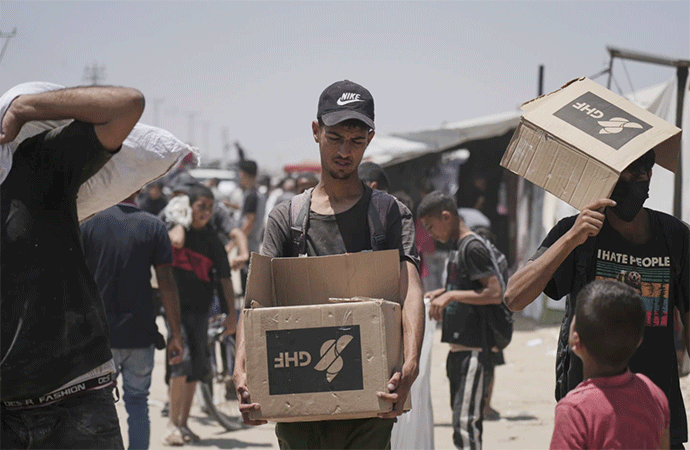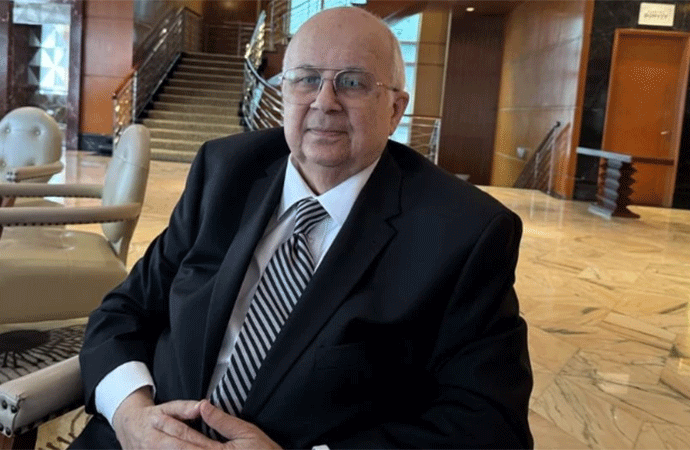World this week

Photo: AP/UNB
Twenty Palestinians were killed at a food distribution center run by an Israeli-backed American organization in the Gaza Strip on Wednesday (Jul. 16), mostly from being trampled. Distribution at The Gaza Humanitarian Foundation sites has often been chaotic, with observers flagging sinister features. Boxes of food are left stacked on the ground inside the center and, once opened, crowds charge in to grab whatever they can, according to witnesses and videos released by GHF itself.
In videos obtained recently by AP from an American contractor working with GHF, contractors are seen using tear gas and stun grenades to keep crowds back behind metal fences or to force them to disperse. Gunshots can also be heard. The United Nations human rights office said till Tuesday, 875 Palestinians had been killed while seeking food at GHF sites since May. Of those, 674 were killed while en route to GHF food sites. The rest were reportedly killed while waiting for aid trucks entering Gaza.
In the US, inflation accelerated in June as the impacts of Donald Trump's tariffs slowly started to show in prices. Business leaders have said for months that the high, volatile rates of Trump's tariffs will force companies to raise consumer prices. Prices remained stable in the spring, particularly as many of Trump's highest tariffs were paused; however, they started increasing in May and have continued to rise in June.
Annual inflation rose to 2.7% in June, up from 2.4% in May, according to the Consumer Price Index (CPI), which tracks the prices of a basket of goods and services each month. Core CPI, which leaves out energy and food prices, ticked up slightly to 2.9%, compared with 2.8% in May. The prices of appliances, furniture and toys, products typically manufactured outside the US, all rose. Food prices increased by 3%. According to the Yale Budget Lab, Americans now face an average tariff rate of 18.7% - the highest rate since 1933.
The United Kingdom, France and Germany have agreed to restore tough UN sanctions on Iran by the end of August if there has been no concrete progress on a nuclear deal, two European diplomats told the AP. The three countries' ambassadors to the United Nations met Tuesday at Germany's UN Mission to discuss a possible Iranian deal and reimposing the sanctions. The matter also came up in a phone call Monday between U.S. Secretary of State Marco Rubio and the foreign ministers of the three countries, according to two U.S. officials.
The State Department said after the call that the four had spoken about "ensuring Iran does not develop or obtain a nuclear weapon." The officials and diplomats spoke on condition of anonymity to discuss private conversations. The UK, France and Germany are part of an agreement reached with Iran in 2015 to rein in its nuclear program, from which President Donald Trump withdrew the US during his first term, insisting it wasn't tough enough.
Syrian government officials and leaders in the Druze religious minority announced a renewed ceasefire after days of clashes that threatened to unravel the country's postwar political transition and have drawn intervention by Syria's powerful neighbor, Israel. It was not immediately clear if the new agreement - which was announced by Syrian state media and in a video message by a Druze religious leader - would hold. A previous ceasefire announced the day before quickly fell apart.
The announcement on Wednesday (Jul. 16) came after Israel launched a series of rare airstrikes in the heart of Damascus, part of a campaign that it said is intended to defend the Druze - who also form a substantial community in Israel - and to push Islamic militants away from its border. The escalating violence has appeared to be the most serious threat yet to the ability of Syria's new rulers to consolidate control of the country after a rebel offensive led by Islamist insurgent groups ousted the Assad regime.

























Leave a Comment
Recent Posts
Pedaling Through the Mangroves ...
The journey from the bustling streets of Barishal to the serene, emera ...
Why the Interim Government mus ...
Two weeks out from what is expected to be a red letter day in the figh ...
Doesn’t matter who thinks what about Bangladesh deci ..
The Other Lenin
US President Donald Trump said his administration
Govt moves to merge BIDA, BEZA, BEPZA, MIDA